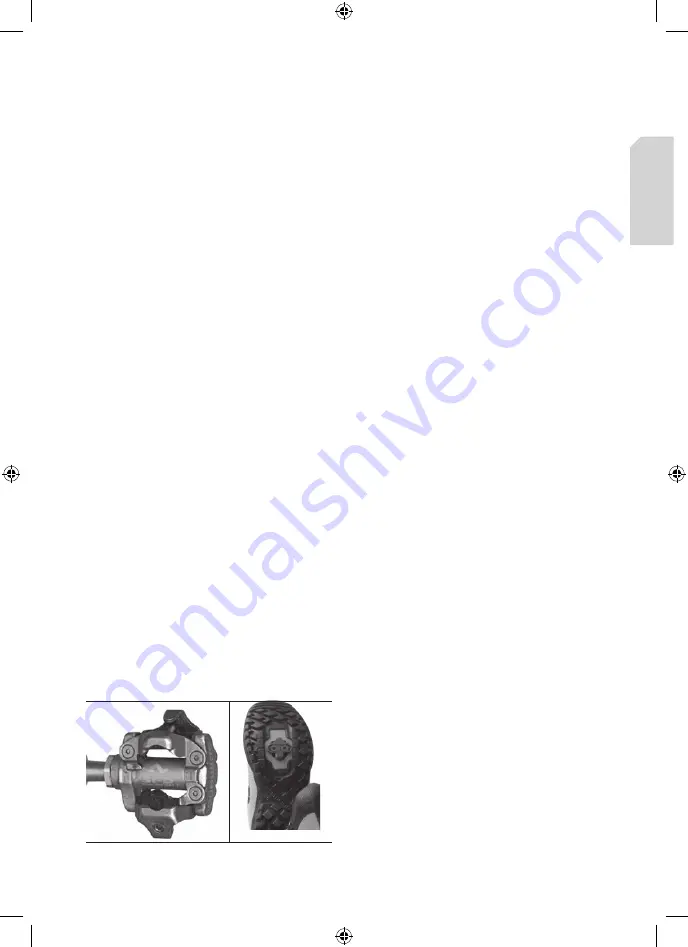
O W N E R ’ S M A N U A L
• 91
ENGLISH
Instead, find the “starting gear” for the conditions —
a gear which is hard enough for quick acceleration
but easy enough to let you start from a stop without
wobbling — and experiment with upshifting and
downshifting to get a feel for the different gears. At
first, practice shifting where there are no obstacles,
hazards or other traffic, until you’ve built up your
confidence. Learn to anticipate the need to shift, and
shift to a lower gear before it gets too steep. If you
have difficulties with shifting, the problem could be
mechanical adjustment. See a specialized bicycle
dealer for help.
Pedals
Some bicycles are equipped with pedals that have
sharp and potentially dangerous surfaces. These
surfaces are actually designed to increase safety by
offering more grip to the rider’s shoe. If your bicycle
has this type of high-performance pedal, you must
take extra care to avoid injury from the pedals’ sharp
surfaces. Based on your riding style or skill level, you
may prefer a simpler pedal design. Ask a specialized
bicycle dealer for help & recommendations.
Some IDEAL bicycles may be equipped with pedals
that have toeclips and straps.These are ways to
keep feet correctly positioned and engaged with
the pedals. The toeclip positions the ball of the foot
over the pedal spindle, thus maximizing pedaling
power. The toe strap, when tightened, keeps the
foot engaged throughout the rotation cycle of the
pedal. Getting into and out of pedals with toeclips
and straps requires skill which can only be acquired
with practice.
Clipless pedals are another way to keep feet
securely in the correct position for maximum
pedaling efficiency. They have a plate called “cleat”
on the sole of the shoe, which clicks into a mating
spring-loaded fixture on the pedal.
They only engage or disengage with a very specific
motion which must be practiced until it becomes
automatic. Clipless pedals require shoes and cleats
which are compatible with the make and model pedal
being used. Many clipless pedals are designed to
allow the rider to adjust the amount of force needed
to engage or disengage the foot. Follow the pedal
manufacturer’s instructions, or ask a specialized
bicycle dealer to show you how to make this
adjustment. Use the easiest setting until engaging
and disengaging becomes a reflex action, but always
make sure that there is sufficient tension to prevent
unintended release of your foot from the pedal.
Practice is required to learn to engage and disengage
the foot safely. Until engaging and disengaging the
foot becomes a reflex action, the technique requires
concentration which can distract your attention and
cause you to lose control and fall. Practice engaging
and disengaging clipless pedals in a place where
there are no obstacles, hazards or traffic; and be sure
to follow the pedal manufacturer’s setup and service
instructions. If you do not have the manufacturer’s
instructions, see a specialized IDEAL bicycle dealer
or contact the manufacturer.
Toe Overlap occurs when one of the pedals is in the
most forward position, you turn the handlebar to
steer, and your toe touches the front wheel. This is
common on small-size or super-compact-geometry
frames, and can be avoided by keeping the inside
pedal up and the outside pedal down when making
sharp turns. On any bicycle, this technique will also
prevent the inside pedal from striking the ground in
a turn. Toe Overlap could cause you to lose control
and fall. Ask a specialized bicycle dealer to help you
determine if the combination of frame size, crank
arm length, pedal design and shoes you will use
results in pedal overlap. Please note that whether
you have overlap or not, you must always keep the
inside pedal up and the outside pedal down when
making sharp turns.
Bicycle Suspension
Most IDEAL bicycles are equipped with suspension
systems. There are many different types of suspension
systems. If your bicycle has a suspension system of
any kind, be sure to read and follow the suspension
manufacturer’s setup and service instructions. If you
do not have the manufacturer’s instructions, see
see a specialized IDEAL bicycle dealer or contact
the manufacturer. Failure to maintain, check and
ideal owners manual english_5_2014.indd 91
4/30/14 13:38
















































